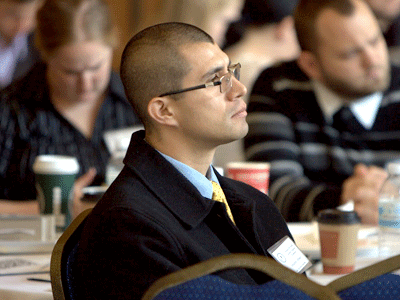
Student group promotes liberty and self determination ---
“You can do whatever you want but you can’t harm anyone else – liberty ends when you start hurting other people,” says Jorge Espinoza as he explains the principles of a growing student group called Students for Liberty.
Emphasizing individualism and the ability to change your life, the nonprofit organization is run by students and recent graduates such as Espinoza, a twenty-one year old UC Berkeley student. The organization’s mission is to provide a unified, student-driven forum of support for students and student organizations dedicated to liberty.
“Students are standing up and taking the lead in the fight for personal and economic freedom,” stated a news release from Students for Liberty, which asserts that the average young person is fiscally conservative and socially liberal, and that a growing number of students are identifying as libertarians.
Maximizing personal freedom and minimizing government control of people’s lives are the main goals of the libertarian ideology.
“Less government intervention in absolutely every dimension of our lives,” is what Espinoza says is the desire of libertarians.
“A lot of times the government is paternalistic – it treats people as children and doesn’t let them take responsibility for their lives.”
Espinoza offers the example of government censorship of certain content on TV or the internet. “If I had kids, it’s my responsibility to protect them from certain things.”
Growth of groups such as Students for Liberty seems to be fueled by a growing dissatisfaction with government and by students’ natural inclination to questions things and develop their own understanding of the world.
Earlier this month, Students for Liberty hosted their annual Northern California Regional Conference at the University of California, Berkeley. The event was designed to improve students’ understanding of what it is to advocate for a free society, and to develop the skills necessary to be a leader for liberty at school and in their daily lives. Speakers included researchers, authors, scholars and leaders in the liberty movement.
The event was one of twelve Students for Liberty Regional Conferences across the nation this fall. More than 500 students attended their national conference this year. The organization is also active in Canada and Europe.
One reason Espinoza was attracted to a group like Students for Liberty is that he never accepted the dominant views he saw since his first days at UC Berkeley.
“Everyone around me was with a similar view, and what they tried to sell me that I was oppressed by this capitalist system and that I was doomed,” says Espinoza. “I never believed it. In my life I never experienced the obstacles that they said, so I didn’t believe it.”
Espinoza’s beliefs were also shaped by the life experience of his parents, who emigrated to the U.S. from Mexico.
“They had the ability to move to another country with another language and they could do it - why can’t anyone?”
Despite the many success stories of Hispanic immigrants, Espinoza says he feels that on the university campus the Hispanic community is not receptive to pro-capitalist visions of the world. He believes that capitalism is not the problem but rather the government’s failure to limit corruption. “We want to see more controls to limit corruption,” he adds.
Espinoza went to the Occupy Oakland protests. “There were hard working people there but it was so easy for this movement to be hijacked by others - when these groups come in and try to sell their own agenda it can be difficult.
My concern with a leftist mindset is that they are trying to teach me that capitalism is oppressive and doesn’t like people of color.”
He says he is concerned about the messages being sent to the Hispanic community. “That they can’t succeed under capitalism and they have to wait for capitalism to be overthrown - that’s the wrong message.
I tell my community that they have complete control of their success.”

